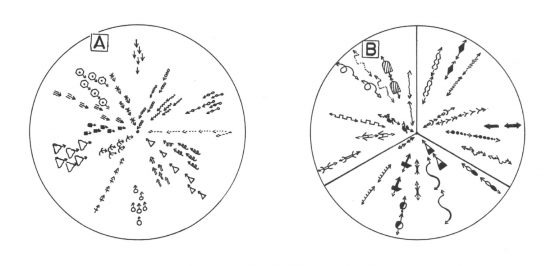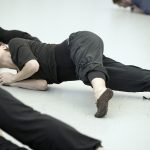17. – 20. Mai 2018
Installation, Galerie 2
Konzept und leitende Forscherin: HannaH Walter
Studierende DMU können sich anmelden bei: hannah.walter@zhdk.ch
(Open Call Studierende)
DKV, Master Trans + Kollaboration mit Studierenden aus dem DMU, Musik/Schulmusik
The composer is not present.
Ein kollektives Forschungsexperiment über die Praxis der Interpretation
Die Versuchsanordnung: Es werden 2 Gruppen mit maximal 5 Spielern gebildet. Gruppe A ist disziplinär: ein Ensemble aus professionell ausgebildeten Musiker*innen und geübten, disziplinierten Interpret*innen. Gruppe B ist antidisziplinär: ein Kollektiv verschiedener Disziplinen und Praktiken. Der Gegenstand der Interpretation ist eine Sammlung von 36 Modellen in je 3 Variationen verschiedener Abstraktionsgrade (Notation, Graphik, Konzept).
Während die Gruppen im beschriebenen System handeln und künstlerische Interpretationsentscheidungen treffen, untersuchen sie die Praxis der kollektiven Interpretation und Entscheidungsfindung. Die aus der als Aktionsforschung beschriebenen Praxis entstandenen Daten und Erfahrungen über den kollektiven Entstehungsprozess künstlerischer Entscheidungen werden in einer Installation präsentiert.
HannaH Walter investigates the possibilities hidden in the open scores of composer Vinko Globokar’s Individuum – Collectivum. The project is part of a larger effort by the violinist at reinterpreting and restaging the works of the musical avant-garde and now quasi-canonical New Music repertoire. The majority of contemporary scores in the genre are conceived with only a slim margin for interpretation. The work being investigated, Individuum – Collectivum, opposes this tendency. It is less a work than a collection of so-called “models” which one can read, develop as performances, or use as pedagogical tools. The score is understood not as fixed, but rather as a space for communicating, creating, and learning, facilitated by the printed instructions.
Each model exists in three versions: for amateur musicians who cannot read notation, for professional musicians, and a conceptual, abstract version. Using a quasi-scientific setup, Walter will interrogate the score by testing their claims to openness. Two test groups, one of professional musicians, the other made up of a transdisciplinary team, will work on and perform the pieces. Because there is no one specific way to realize the scores, Walter’s experiment will necessarily begin to shimmer between compositional intention and (mis)reading of instruction, problematizing both the experiment itself, as well as the capacity of Individuum – Collectivum, and their respective ability to fulfil their part of the entanglement.
Significant about Walter’s work is that she is an embodiment of what could perhaps be called an “emancipated” performer, in the sense that her practice is developing towards a place where she is no longer beholden to the tyranny of the score. She emphasizes her own, often drastic, re-readings of pieces which through re-contextualization gain entirely new dimensions and significance. Globokar’s work is in this regard a fitting forerunner to Walter, as he himself is a renowned trombonist as well as composer whose compositions acknowledge that there are always mitigating circumstances that disrupt and change what is intended.






Kommentare von traddatz